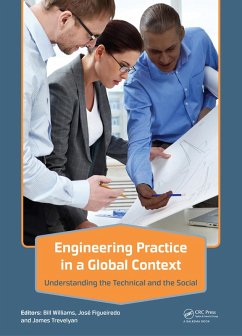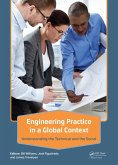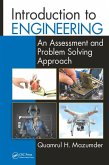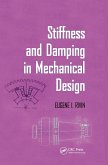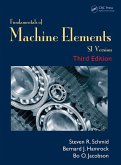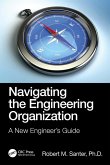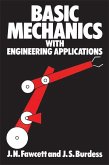Engineering Practice in a Global Context (eBook, PDF)
Understanding the Technical and the Social
Redaktion: Williams, Bill; Trevelyan, James; Figueiredo, José


Alle Infos zum eBook verschenken

Engineering Practice in a Global Context (eBook, PDF)
Understanding the Technical and the Social
Redaktion: Williams, Bill; Trevelyan, James; Figueiredo, José
- Format: PDF
- Merkliste
- Auf die Merkliste
- Bewerten Bewerten
- Teilen
- Produkt teilen
- Produkterinnerung
- Produkterinnerung

Hier können Sie sich einloggen

Bitte loggen Sie sich zunächst in Ihr Kundenkonto ein oder registrieren Sie sich bei bücher.de, um das eBook-Abo tolino select nutzen zu können.
This book aims to both characterize the technical and social aspects of engineering practice and to look at ways that this characterization can be important in the design of engineering courses in higher education. The principal contours of the work include the study of engineering practice and its relation to knowledge, competences and to cross-disciplinary and identity contexts. Empirical data on the practice of engineering professionals are presented from a range of companies in different national contexts, including engineering design companies and engineering innovation leaders.
- Geräte: PC
- mit Kopierschutz
- eBook Hilfe
- Größe: 14.78MB
![Engineering Practice in a Global Context (eBook, ePUB) Engineering Practice in a Global Context (eBook, ePUB)]() Engineering Practice in a Global Context (eBook, ePUB)40,95 €
Engineering Practice in a Global Context (eBook, ePUB)40,95 €![Introduction to Engineering (eBook, PDF) Introduction to Engineering (eBook, PDF)]() Quamrul H. MazumderIntroduction to Engineering (eBook, PDF)152,95 €
Quamrul H. MazumderIntroduction to Engineering (eBook, PDF)152,95 €![Stiffness and Damping in Mechanical Design (eBook, PDF) Stiffness and Damping in Mechanical Design (eBook, PDF)]() Eugene RivinStiffness and Damping in Mechanical Design (eBook, PDF)68,95 €
Eugene RivinStiffness and Damping in Mechanical Design (eBook, PDF)68,95 €![Fundamentals of Machine Elements (eBook, PDF) Fundamentals of Machine Elements (eBook, PDF)]() Steven R. SchmidFundamentals of Machine Elements (eBook, PDF)102,95 €
Steven R. SchmidFundamentals of Machine Elements (eBook, PDF)102,95 €![Navigating the Engineering Organization (eBook, PDF) Navigating the Engineering Organization (eBook, PDF)]() Robert M. SanterNavigating the Engineering Organization (eBook, PDF)50,95 €
Robert M. SanterNavigating the Engineering Organization (eBook, PDF)50,95 €![Basic Mechanics with Engineering Applications (eBook, PDF) Basic Mechanics with Engineering Applications (eBook, PDF)]() J. JonesBasic Mechanics with Engineering Applications (eBook, PDF)51,95 €
J. JonesBasic Mechanics with Engineering Applications (eBook, PDF)51,95 €![Implementing Concurrent Engineering in Small Companies (eBook, PDF) Implementing Concurrent Engineering in Small Companies (eBook, PDF)]() Susan SkalakImplementing Concurrent Engineering in Small Companies (eBook, PDF)68,95 €
Susan SkalakImplementing Concurrent Engineering in Small Companies (eBook, PDF)68,95 €-
-
-
Dieser Download kann aus rechtlichen Gründen nur mit Rechnungsadresse in A, B, BG, CY, CZ, D, DK, EW, E, FIN, F, GR, HR, H, IRL, I, LT, L, LR, M, NL, PL, P, R, S, SLO, SK ausgeliefert werden.
- Produktdetails
- Verlag: Taylor & Francis eBooks
- Seitenzahl: 302
- Erscheinungstermin: 3. September 2013
- Englisch
- ISBN-13: 9781315879369
- Artikelnr.: 40391404
- Verlag: Taylor & Francis eBooks
- Seitenzahl: 302
- Erscheinungstermin: 3. September 2013
- Englisch
- ISBN-13: 9781315879369
- Artikelnr.: 40391404
- Herstellerkennzeichnung Die Herstellerinformationen sind derzeit nicht verfügbar.
framework for engineering practice. The practical confrontation of
engineers with a new design endeavour: The case of digital humanities.
Engineering design teams: Considering the forests and the trees. Working
together across disciplines. Engineering problem-solving in social
contexts: 'Collective wisdom' and 'ba'. Finding workable solutions:
Portuguese engineering experience. Going back to heterogeneous engineering:
The case of micro and nanotechnologies. Professional lock-in: Structural
engineers, architects and the disconnect between discourse and practice.
Observations of South Asian engineering practice. Mathematics in
engineering practice: Tacit trumps tangible. Engineers' professional
learning: Through the lens of practice.
framework for engineering practice. The practical confrontation of
engineers with a new design endeavour: The case of digital humanities.
Engineering design teams: Considering the forests and the trees. Working
together across disciplines. Engineering problem-solving in social
contexts: 'Collective wisdom' and 'ba'. Finding workable solutions:
Portuguese engineering experience. Going back to heterogeneous engineering:
The case of micro and nanotechnologies. Professional lock-in: Structural
engineers, architects and the disconnect between discourse and practice.
Observations of South Asian engineering practice. Mathematics in
engineering practice: Tacit trumps tangible. Engineers' professional
learning: Through the lens of practice.
